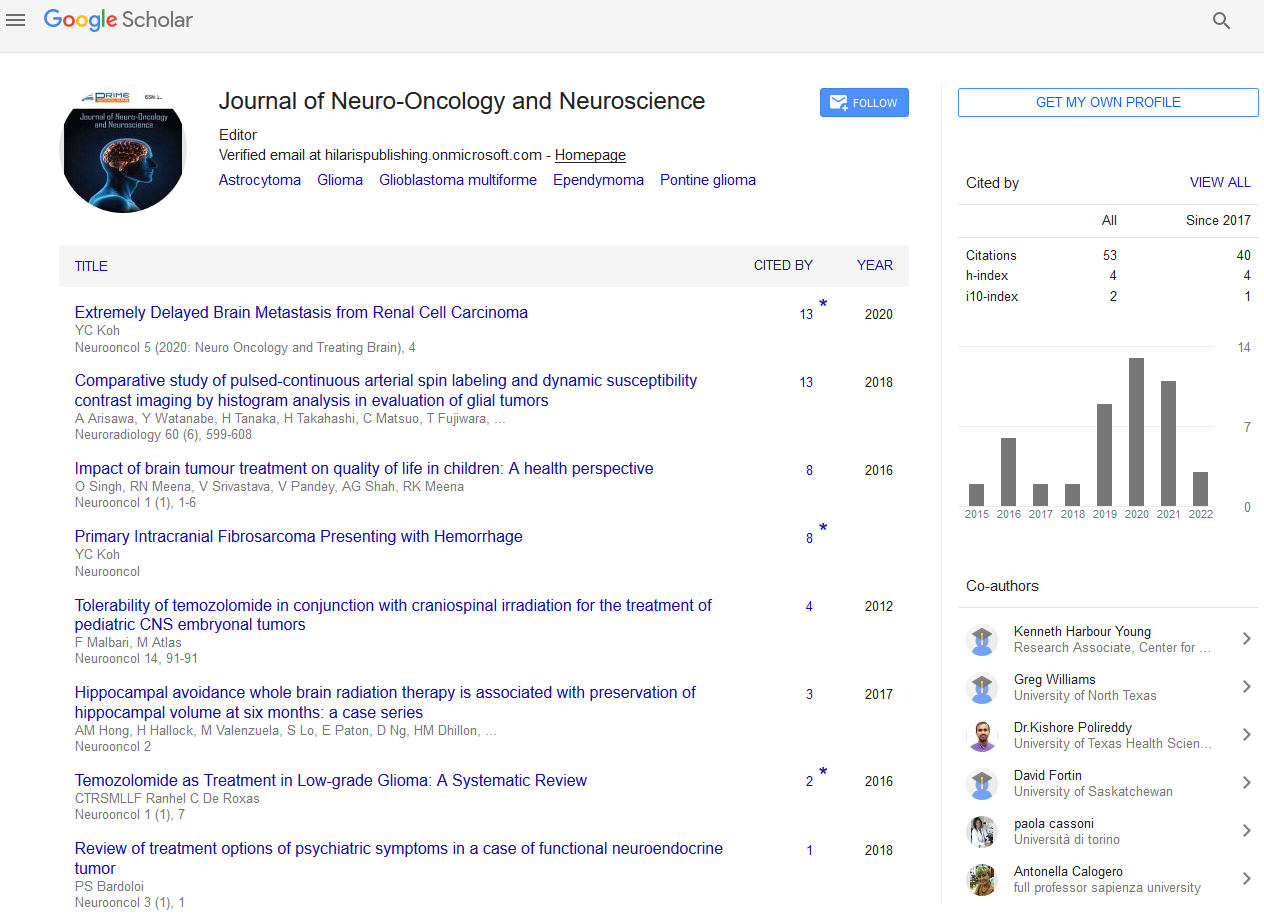Commentary Article - (2023) Volume 8, Issue 3
Deciphering the Molecular Pathways in Brain Tumor Development: Insights and Implications
Mohammed Parvez*
Department of Neurosurgery, Shahid Beheshti University of Medical Sciences, Iran
*Correspondence:
Mohammed Parvez,
Department of Neurosurgery, Shahid Beheshti University of Medical Sciences,
Iran,
Email:
Received: 30-Aug-2023, Manuscript No. IPJNO-24-19607;
Editor assigned: 01-Sep-2023, Pre QC No. IPJNO-24-19607 (PQ);
Reviewed: 15-Sep-2023, QC No. IPJNO-24-19607;
Revised: 20-Sep-2023, Manuscript No. IPJNO-24-19607 (R);
Published:
27-Sep-2023, DOI: 10.21767/2572-0376.8.3.22
Description
The development of brain tumors involves a complex interplay
of genetic, epigenetic, and environmental factors, giving rise
to heterogeneous neoplasms with diverse clinical behaviors.
Understanding the molecular pathways driving tumorigenesis
is essential for unraveling the underlying mechanisms of brain
tumor development and identifying potential therapeutic targets.
In recent years, significant progress has been made in elucidating
these pathways, offering insights into the molecular
landscape of brain tumors and paving the way for more precise
and effective treatment strategies. One of the key pathways
implicated in brain tumor development is the receptor tyrosine
kinase (RTK) signaling pathway. RTKs play crucial roles in regulating
cell growth, proliferation, and survival, and aberrant activation
of RTK signaling is commonly observed in various types
of brain tumors. For example, amplification and overexpression
of the epidermal growth factor receptor (EGFR) are frequently
observed in glioblastoma, the most aggressive form of primary
brain tumor. Activation of EGFR signaling promotes tumor cell
proliferation and survival, making it an attractive therapeutic
target. Targeted inhibitors of EGFR, such as gefitinib and erlotinib,
have shown promise in preclinical studies and clinical
trials, although challenges such as drug resistance remain significant
hurdles.
Another important pathway in brain tumor development is the
phosphoinositide 3-kinase (PI3K)/AKT/mTOR pathway. Dysregulation
of this pathway is commonly observed in gliomas and
other brain tumors and is associated with tumor growth, invasion,
and resistance to therapy. Genetic alterations such as mutations
in the PIK3CA and PTEN genes, as well as amplification
of the AKT and mTOR genes, contribute to hyperactivation of
this pathway. Targeted inhibitors of PI3K, AKT, and mTOR are
under investigation as potential therapeutic agents for brain
tumors, either as monotherapy or in combination with other
treatment modalities. In addition to RTK and PI3K/AKT/mTOR
pathways, aberrant activation of the mitogen-activated protein
kinase (MAPK) pathway is also implicated in brain tumor
development. The Ras-Raf-MEK-ERK signaling cascade, which
lies downstream of RTKs and other growth factor receptors,
regulates cell proliferation, differentiation, and survival. Mutations
in components of the MAPK pathway, such as BRAF and
NRAS, are found in a subset of brain tumors, including pilocytic
astrocytoma and pleomorphic xanthoastrocytoma. Targeted
inhibitors of BRAF, such as vemurafenib and dabrafenib, have
shown efficacy in BRAF-mutant brain tumors, highlighting the
therapeutic potential of targeting this pathway.
Moreover, alterations in the tumor suppressor pathways, such
as the p53 and retinoblastoma (Rb) pathways, contribute to the
development and progression of brain tumors. Loss of function
mutations in the TP53 gene are commonly observed in highgrade
gliomas and are associated with poor prognosis. Similarly,
inactivation of the Rb pathway, either through mutations
in the RB1 gene or dysregulation of its upstream regulators,
promotes cell cycle progression and tumorigenesis. Therapeutic
strategies aimed at restoring the function of p53 and Rb
pathways, either through gene therapy or pharmacological interventions,
are being explored as potential treatment options
for brain tumors. Deciphering the molecular pathways involved
in brain tumor development has provided valuable insights into
the pathogenesis of these devastating diseases. Targeting key
signaling pathways, such as RTK, PI3K/AKT/mTOR, MAPK, and
tumor suppressor pathways, holds promise for the development
of more effective therapies for brain tumors. However,
challenges such as tumor heterogeneity, therapeutic resistance,
and off-target effects must be addressed to realize the full potential of targeted therapies in the treatment of brain
tumors. Through continued research and innovation, we strive
to translate our growing understanding of molecular pathways
into improved outcomes for patients with brain tumors.
Acknowledgement
None.
Conflict Of Interest
The author’s declared that they have no conflict of interest.
Citation: Parvez M (2023) Deciphering the Molecular Pathways in Brain Tumor Development: Insights and Implications. Neurooncol. 8:022.
Copyright: 2023 Parvez M. This is an open-access article distributed under the terms of the Creative Commons Attribution License, which permits unrestricted use, distribution, and reproduction in any medium, provided the original author and source are credited.

